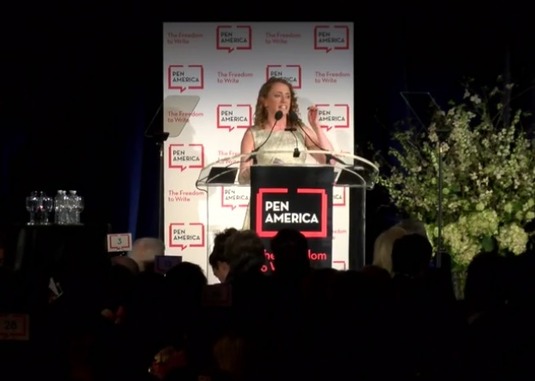
By Patrick Connors
AlterNet
Israeli government threats against the well-being and freedom of expression of Palestinian civil society leaders who organize for a boycott of Israel have pre-occupied human rights organizations and made headlines in recent weeks. Simultaneously, the Israeli government is escalating attacks on Palestinian writers. It is currently detaining 19 journalists and a poet.
Given these realities, it may seem surprising that just a few weeks ago an organization that promotes itself as a leading defender of writers and freedom of expression, PEN American Center, spurned calls to drop Israeli government sponsorship of PEN’s annual literary festival that ended in early May.
This long-simmering controversy bubbled over last month when over 200 writers, poets, translators and editors, and 16,500 other individuals, signed a letter initiated by Adalah-NY asking the New York City-based PEN American Center to reject Israeli government funding for PEN’s World Voices Festival (PWVF). The letter is anchored in the Palestinian call for boycott, divestment and sanctions (BDS) against Israel.
Literary figures including Angela Davis, Junot Díaz, Louise Erdrich, Richard Ford, Eileen Myles, Michael Ondaatje, Alice Walker, and Cornel West signed the letter. This backing reflects the growing consensus that, as with apartheid South Africa, a civil society boycott is an appropriate response to Israeli violations of fundamental Palestinian rights, which are enabled by our government’s uncritical support for Israel.
The letter asserted that:
Partnership with the Israeli government amounts to a tacit endorsement of its systematic violations of international law and Palestinian human rights, including the right to freedom of expression for writers and journalists. This is not, we emphasize, a call to boycott individual Israelis or to deny their freedom of expression.
PEN responded negatively, stating, “PEN does not and cannot subscribe to cultural boycotts of any kind—which impede individual free expression—no matter the cause.“ PEN American Center subsequently noted a 2007 policy opposing cultural boycotts.
PEN’s response was PR spin that didn’t engage the letters’ substance. As frustrated writers highlighted, the letter and the Palestinian cultural boycott call explicitly target the Israeli government and complicit institutions, do not target individual Israeli writers, and aim to preserve freedom of expression. In a meeting that I attended, PEN American Center’s Executive Director Suzanne Nossel rejected offers by writers and publishers to fundraise to cover Israeli writers participation. With Israeli writers not targeted, PEN American Center never explained whose freedom of expression it claimed to be protecting.
Adding to the hypocrisy, weeks after rejecting the letter, PEN American Center endorsed cultural boycott activities targeting Azerbaijan by signing letters asking Pharrell Williams, Enrique Iglesias and Chris Brown to “stand for human rights in Azerbaijan and cancel your Baku performance.”
PEN American Center Board Chair Andrew Solomon has, in the past, highlighted the effectiveness of cultural boycott, explaining that the cultural boycott of South Africa in the 1980s “served to undermine” and “speed the demise of apartheid.” In 2006, Suzanne Nossel proposed a “sports boycott” of Iran to support Israel.
Israel’s funding for PEN is part of a government public relations initiative called Brand Israel that uses cultural productions to distract from violations of Palestinian rights. Following Israel’s 2009 attack on Gaza, Arye Mekel, Israeli government’s ministry’s deputy director general for cultural affairs summarized the strategy, saying, “We will send well-known novelists and writers overseas, theater companies, exhibits… This way you show Israel’s prettier face, so we are not thought of purely in the context of war.”
The Israeli government has benefited from associating itself with PEN for years. The letter noted the only three statements that PEN American Center has issued about Israeli violations of the rights of Palestinian writers and journalists. This is despite decades of abuses.
PEN American Center didn’t report, for example, on Israel’s refusal to allow Palestinian American novelists and PEN members Susan Abulhawa andRanda Jarrar to visit Palestine. Nor did it report Israel’s jailing of Palestinian cartoonist Mohamed Saba’aneh. Though the Committee to Protect Journalists ranks Israel number 101 out of 180 countries in press freedom, PEN American Center reports minimally on Israel’s escalating repression of Palestinian journalists. Only after days of social media pressure this April did PEN American Centercriticize Israel’s arrest of journalist Omar Nazza and express meek “concerns” about poet Dareen Tatour’s arrest.
PEN American Center’s current executive director Suzanne Nossel worked for the State Department for years, most recently under Hillary Clinton, where the “defense of Israel” was among her priorities. Nossel is now a volunteer adviser to Clinton’s presidential campaign, and is rumored to aspire to a post in a possible Clinton administration.
Nossel coined the term “smart power,” writing:
“Smart power means knowing that the United States’ own hand is not always its best tool. U.S. interests are furthered by enlisting others,” including “international institutions.”
She also asserted that “military power and humanitarian endeavors can be mutually reinforcing.” Some PEN members told us that PEN’s positions increasingly resembles those of the State Department, and they fear it is being turned into an instrument of an interventionist, militaristic US foreign policy, as Nossel is accused of attempting when with Amnesty International USA.
Candidate Clinton has repeatedly stated her unwavering commitment to Israel, and falsely conflated the movement to boycott Israel with anti-Semitism. Therefore, it seems likely that Nossel doesn’t want PEN to be seen as acceding to the boycott.
Still there is hope for change, because so many are troubled by PEN American Center’s unprincipled stance. Significantly, PEN International, the organization’s global hub, has vowed to act. PEN International’s president Jennifer Clement wrote in a press release, “PEN International shares your concern. At present we are formalizing our recommended guidelines for the world’s PEN Centres regarding funding from countries with a poor record on freedom of expression.”
PEN American Center may try to extricate itself by adopting a policy prohibiting funding from repressive governments, including the Israeli government, while sidestepping a formal endorsement of a boycott of Israel. This would be a victory for human rights. Still, it would be more intellectually honest for PEN American Center to directly grapple with the Palestinian cultural boycott’s emphasis on individual freedom of expression, and to address PEN’s contradictory endorsement of cultural boycott activities targeting Azerbaijan.
Whatever the ultimate outcome, the broad support for PEN to reject Israeli government funding is another example of the growing strength of the Palestinian boycott movement for freedom, justice and equality.
Source: www.alternet.org






